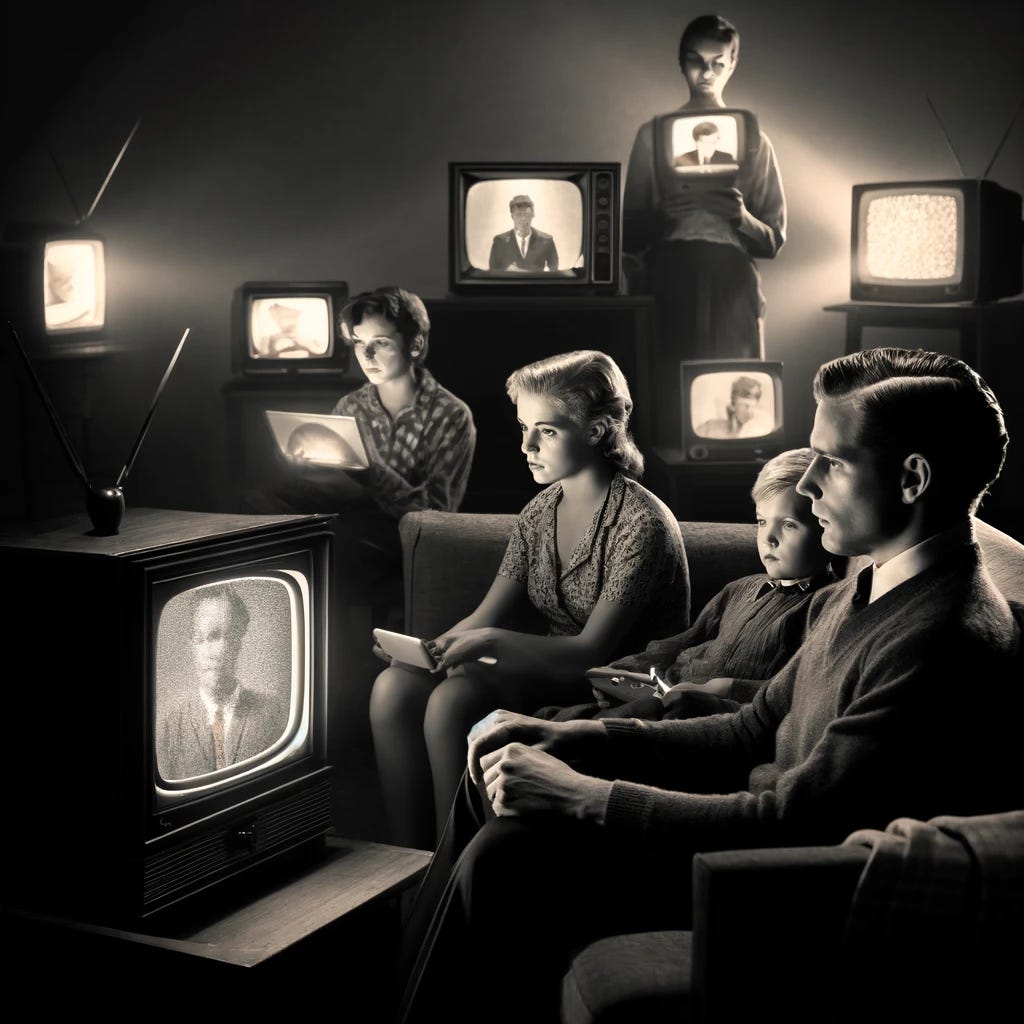In my last post I said I was ‘Mad as Hell’ about pixelation, and how people have been reduced to pixels inside technology.
As I was reflecting on this, I found myself drifting back to that moment when black and white television began to take the colour from our lives.
The Arrival of Television: A Portal to Progress
When I was around ten or eleven I arrived home from school, to find a television had arrived before me, taking centre stage in our living room, rearranging the furniture and our way of life. No longer was our lounge room a place for listening to one another, but a place for watching something else.
I recall staring at the black-and-white screen, my thoughts a jumble, as my father, mistaking my silence for awe, remarked “He's speechless.” He believed I was overwhelmed by the technological marvel, and the middle-class status it represented. In truth, this new addition to our family marked a profound shift in our family dynamic, one where television began to dictate our attention and silence our voices.
Speechlessness became a defining feature of our family life as the television replaced conversation.We were no longer engaging with each other; instead, we sat quietly, absorbing whatever was broadcast. The television dictated what was important, and we accepted this without question.
I vividly recall a newsflash interrupting an afternoon program—probably “Skippy, the Bush Kangaroo”—solemnly and seriously announcing that Governor George Wallace of Alabama, had been shot. I rushed to get my parents, thinking a ‘news flash’ interrupting programming signalled a world-changing event. We stood silently as grainy black-and-white footage replayed, and the words “attempted assassination of Governor George Wallace” scrolled across the screen. In our small lounge room, in a remote part of Australia, we felt connected to global events.
This moment exemplified how television could amplify distant events, making them feel immediate and personal. But it also heralded something far deeper and more insidious, as we subtly but surely adopted the impersonal authority of the curated news in place of the care and concern of family and community. The transition was stark, although hidden to us at the time. We graduated from silent fixation on a newsflash to silent fixation on the nightly news at 7pm. Dinner was now synchronised with TV programming, and news in particular. With military precision, my mother had dinner ready and grace said just before the dulcet tones of the newsreader announced, “here is the news” and my father announced “Quiet! The news is on,” signalling that the television’s content was paramount. Our home, once a place where parental voices guided and shaped our understanding of the world, became dominated by the authoritative voice of the television. This subtle yet powerful shift illustrated how media began to dictate our perceptions and priorities, shaping our worldviews and silently demanding our obedience and respect.
The nightly ritual of gathering around the television reshaped our family life. Dinner was no longer a time for sharing stories from day, but for consuming stories about someone else’s day. As we quietly digested our food, we ingested a diet of news and views. Television was a conversation killer, turning us into passive consumers of information, rather than active participants in each other’s lives. Gosh, I wish we had questioned that and used it as an opportunity for critical thinking.
We lived now under a dictatorship of silence. But this was not the monastic silence that stills the heart so we can truly know ourselves, but rather manufactured silence that stifled our voices and imposed external narratives. Monastic silence invites contemplation and connection to what truly matters, while this new, manufactured silence, silenced us, and compelled us to listen to voices far removed from our own lives.
Television connected us to the wider world, but it disconnected us from each other. It dictated the terms of our engagement with reality, and subtly but effectively eroded our family relationships. As we became passively consumers, we lost the ability to converse deeply with one another. This phenomenon raises a critical question: if television silenced us, what are later technologies doing? While they enable virtual connections, might they be further disconnecting us from ourselves and those physically around us, undermining our capacity for genuine interaction and self-reflection?
From Television to the Internet: Erosion of Attention
The advent of television marked the beginning of a broader erosion of attention that has only intensified with the rise of the internet, which has further reshaped family dynamics, silenced our voices, fragmented our focus, and distorted our sense of what truly matters. While television filtered out much that was not deemed relevant, we are now overwhelmed with a deluge of information that demands our constant attention and engagement. We once turned on the TV after school or work—now we turn to our devices as soon as we wake up, staying perpetually “on” and connected. This relentless immersion in technology, far from enriching our lives, often leaves us feeling more isolated and distracted, undermining our relationships and our ability to engage meaningfully with the world around us.
Television dominated dinner and stopped us talking to one another. But at least we were outside looking in. Now we are inside looking out, trapped in the tech, just a pixel in the screen, disconnected not only from one another, but from ourselves.
The Algorithmic Trap
Algorithms are designed to keep us scrolling, never quite satisfying our need for content, always promising fulfillment in the next post. This endless cycle leaves us more tired and unsatisfied, with our attention fragmented and our ability to focus on meaningful interactions diminished. Have you noticed how Facebook and Instagram reels leave you hanging, compelling you to watch just one more? Hours evaporate, leaving us with nothing to show but wasted time and missed opportunities.
Each morning I wake with the best of intentions—prayer, meditation, reading, exercise. Yet, as I roll over in bed and reach for my phone, my day derails. Why do I need to check messages, news, and social feeds, deluding myself that I am staying informed and connected. This weakness consumes hours that could be better spent in deep, intentional activities. I justify my actions by claiming to be curious and eager to learn, yet this curiosity often leads to superficial knowledge, leaving little room for deep reflection or purposeful action.
This mindless browsing steals precious time that could be used for activities that genuinely enrich our lives. Instead of investing in meaningful relationships, spiritual growth, or personal development, I waste hours on trivial content. This digital addiction mirrors the way television once dominated our family time, but with an even greater hold on daily routines and mental space. By constantly succumbing to these distractions, we sacrifice our ability to engage deeply with ourselves and others, undermining the very essence of our humanity.
A Modern Sabbath
I waste so much time doing so little. It’s a waste of a precious commodity, on something I could do without. I did not need to know about George Wallace, and nor do I need to know about countless other more trivial things. That time can be used to do what is important, for what will have to be done later. Playing catch up later means that time is unavailable for who or for what needs it at that moment—depriving someone or something of a part of me, of that attention that they needed.
Have you ever noticed how productive you become when you are leaving on Friday for a three-week vacation? That plane is taking off with our without you. You say no to unnecessary meetings and prioritise essential work, focusing on what matters. When we have other obligations that will take over our time, we dare not waste a second, and we do not.
Is a part of my problem that I am not busy enough? Perhaps I should book a flight for next Saturday?
we are inside looking out, trapped in the tech, just a pixel in the screen,
disconnected not only from one another, but from ourselves
This constant distraction highlights the need for modern rituals that reclaim our time and focus. While the Sabbath is often portrayed as a day of rest, there is a deeper message here: work never ends, and it will dominate your life if you don’t enforce boundaries. We need to create intentional breaks from the digital world to reconnect with the real world. Without such rituals, technology invades every aspect of our existence, leaving us perpetually “on” and unable to fully engage with our surroundings. Downtime rituals help restore balance, foster deeper connections, cultivate a sense of purpose and meaning, and counter intrusive technology. These modern ‘Sabbaths’ can help to regain control over our attention, allowing us to be present and intentional in our interactions and pursuits.
Time for a Warning Label?
Television robbed us of our voice. The internet has stolen our time and attention. Now, we face the encroaching influence of AI, which threatens to strip away our agency and autonomy. AI algorithms subtly shape our choices, making us believe we are acting freely when, in reality, we are being guided by unseen forces. This insidious control erodes our ability to make independent decisions, much like the television producers of the past who dictated what was newsworthy. As we navigate this new technological landscape, we must be vigilant, questioning how these tools influence our lives and ensuring that we retain our agency and humanity. Without such awareness, we risk succumbing to a digital dictatorship that dictates our thoughts, actions, and identities.
Imagine what might be different if that TV never turned up and we never tuned in? This was never going to happen of course. Technology has undoubtedly brought many wonderful benefits, which I would not want to forgo. However, much like a cigarette packet, it should come with a health warning, alerting us to the potential loss of our voice, our attention, our autonomy, and, ultimately, our very identity.
In the meantime, can I suggest a regular digital detox, where you go withdraw from technology, and digital free zones at work, where you encourage face to face and heart to heart communication.



Yes. What you describe is exactly what happened to my family. But then again neither my mother or father knew much about anything. From the moment TV arrived my parents had their evening meal at 5 o'clock, everything was washed and put away so that they/we could watch the six o'clock news then stay trans-fixed for the rest of the evening until it ended, which was at about 11 o'clock back then. From then on they did the same thing for almost every day for the rest of their lives except when they occasionally went out.
There were no books in the house nor classical music - just the radio.
My mother listened to the very popular Blue Hills and When a Girl Marries every day
Marie Winn wrote a book titled The Plug In Drug
Stuart Ewen wrote a book titled Captains of Consciousness
The Hidden Persuaders by Vance Packard also comes to mind.
Very soon the content of many peoples conversations were about what they saw on TV the night before, especially the contents of their favorite programs, especially soap operas.
This essay describes the situation
http://www.awakeninthedream.com/articles/invasion-of-the-body-snatchers-comes-to-life